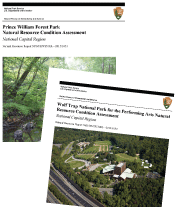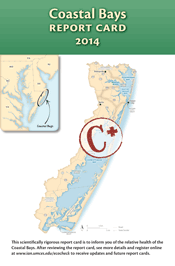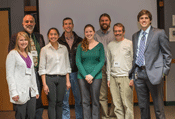Blog Highlights
- Know the connection, know your coast: Coastal Georgia's first ecosystem report card
- Viewing data on a VisWall and in an immersive dome in Fort Collins, Colorado
- From the mountains to the prairies- discussing ecological drought in the North Central United States
- Integration and Application Network in 2015: The year in review
Natural Resource Condition Assessments for Wolf Trap National Park for the Performing Arts, and Prince William Forest Park
 IAN worked with the National Park Service to develop natural resource condition assessments for Wolf Trap National Park for the Performing Arts and Prince William Forest Park. These reports use air quality, water quality, biodiversity, and landscape data to assess the current condition of the parks. The natural resources of both parks were predicted to be negatively affected by climate change. Impacts may include increasing ozone levels and particulate pollution, changing forest composition, and an increase in exotic species and forest pests and diseases. Additionally, both parks were identified as being under threat from surrounding land use, regionally poor air quality, and overpopulation of deer.
IAN worked with the National Park Service to develop natural resource condition assessments for Wolf Trap National Park for the Performing Arts and Prince William Forest Park. These reports use air quality, water quality, biodiversity, and landscape data to assess the current condition of the parks. The natural resources of both parks were predicted to be negatively affected by climate change. Impacts may include increasing ozone levels and particulate pollution, changing forest composition, and an increase in exotic species and forest pests and diseases. Additionally, both parks were identified as being under threat from surrounding land use, regionally poor air quality, and overpopulation of deer.
Maryland Coastal Bays Report Card 2014
 The aim of this report card is to provide a transparent, timely, and geographically detailed assessment of Coastal Bays' health in 2014. Coastal Bays health is defined as the progress of four water quality indicators (total nitrogen, total phosphorus, chlorophyll a, dissolved oxygen) and two biotic indicators (seagrass, hard clams) toward scientifically derived ecological thresholds or goals. These six indicators are combined into one overarching Coastal Bays Health Index, which is presented as the report card score. The overall score for the Coastal Bays was a C+ in 2014, a very similar score to last year.
The aim of this report card is to provide a transparent, timely, and geographically detailed assessment of Coastal Bays' health in 2014. Coastal Bays health is defined as the progress of four water quality indicators (total nitrogen, total phosphorus, chlorophyll a, dissolved oxygen) and two biotic indicators (seagrass, hard clams) toward scientifically derived ecological thresholds or goals. These six indicators are combined into one overarching Coastal Bays Health Index, which is presented as the report card score. The overall score for the Coastal Bays was a C+ in 2014, a very similar score to last year.
Upper Potomac Headwaters Report Card released
 The Upper Potomac Headwaters Report Card was released on December 10th at the UMCES Appalachian Laboratory in Frostburg, MD, as part of their new Watershed Moments Community Learning Series. The report card assessed stream health in the Upper Potomac Headwaters region upstream of Harpers Ferry, WV, and represents a joint effort of graduate students and faculty in the Marine Estuarine Environmental Sciences program at the Appalachian Laboratory and the Integration and Application Network. This report card was completed as part of a graduate class taught by Bill Dennison, Eric Davidson, Bob Hilderbrand, and Andrew Elmore. The following students gave presentations: Jake Hagedorn, Stephanie Siemek, Suzi Spitzer, and Vanessa Vargas to a public audience. Those videos are available on YouTube.
The Upper Potomac Headwaters Report Card was released on December 10th at the UMCES Appalachian Laboratory in Frostburg, MD, as part of their new Watershed Moments Community Learning Series. The report card assessed stream health in the Upper Potomac Headwaters region upstream of Harpers Ferry, WV, and represents a joint effort of graduate students and faculty in the Marine Estuarine Environmental Sciences program at the Appalachian Laboratory and the Integration and Application Network. This report card was completed as part of a graduate class taught by Bill Dennison, Eric Davidson, Bob Hilderbrand, and Andrew Elmore. The following students gave presentations: Jake Hagedorn, Stephanie Siemek, Suzi Spitzer, and Vanessa Vargas to a public audience. Those videos are available on YouTube.
IAN welcomes Kristin Saunders
 Kristin joins IAN as the Cross Program Coordinator for the Chesapeake Bay Program office. Kristin has more than 26 years of leadership spanning five gubernatorial administrations in Maryland. She earned her Bachelor of Science in Journalism from University of Maryland College Park and Master of Public Administration from University of Baltimore. Most recently, Kristin was the Assistant Secretary for Land Resources at the MD Department of Natural Resources. Kristin is a lifelong resident of Maryland; born and raised in Chestertown, now currently residing in Annapolis with her son. In her spare time, she enjoys reading a book or going on nature adventures in the Chesapeake watershed.
Kristin joins IAN as the Cross Program Coordinator for the Chesapeake Bay Program office. Kristin has more than 26 years of leadership spanning five gubernatorial administrations in Maryland. She earned her Bachelor of Science in Journalism from University of Maryland College Park and Master of Public Administration from University of Baltimore. Most recently, Kristin was the Assistant Secretary for Land Resources at the MD Department of Natural Resources. Kristin is a lifelong resident of Maryland; born and raised in Chestertown, now currently residing in Annapolis with her son. In her spare time, she enjoys reading a book or going on nature adventures in the Chesapeake watershed.

